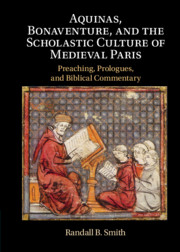 Aquinas, Bonaventure, and the Scholastic Culture of Medieval Paris
Aquinas, Bonaventure, and the Scholastic Culture of Medieval Paris Published online by Cambridge University Press: 05 February 2021
The young candidate – some thought too young – sat behind a large podium at the front of the room. To his left, seated in a long line of chairs, were the junior masters of the university; to his right sat the chancellor and all the senior masters. The previous evening had been spent responding to bachelors and masters in a complex series of “disputed questions.” But now the presiding master stood and placed on his head a biretta and said aloud: “I place on you the magisterial biretta in the name of the Father, and of the Son, and of the Holy Spirit. Amen.” The young candidate had become a master, and after birettas had been distributed to the other masters to place on their own heads, the gathered company sat down to hear the new master deliver his inaugural lecture: the principium. It was spring, 1256, and the new master was the Dominican friar, Thomas d’Aquino, the son of a minor nobleman from Italy, who had grown up in a small castle not too far from the site of the great Benedictine abbey at Monte Cassino, where the newly incepted master had studied as a youth.
To save this book to your Kindle, first ensure no-reply@cambridge.org is added to your Approved Personal Document E-mail List under your Personal Document Settings on the Manage Your Content and Devices page of your Amazon account. Then enter the ‘name’ part of your Kindle email address below. Find out more about saving to your Kindle.
Note you can select to save to either the @free.kindle.com or @kindle.com variations. ‘@free.kindle.com’ emails are free but can only be saved to your device when it is connected to wi-fi. ‘@kindle.com’ emails can be delivered even when you are not connected to wi-fi, but note that service fees apply.
Find out more about the Kindle Personal Document Service.
To save content items to your account, please confirm that you agree to abide by our usage policies. If this is the first time you use this feature, you will be asked to authorise Cambridge Core to connect with your account. Find out more about saving content to Dropbox.
To save content items to your account, please confirm that you agree to abide by our usage policies. If this is the first time you use this feature, you will be asked to authorise Cambridge Core to connect with your account. Find out more about saving content to Google Drive.